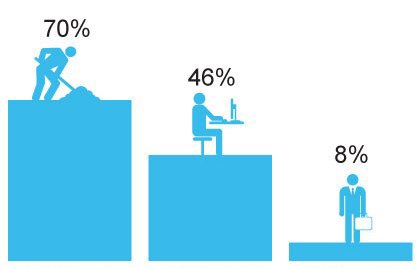QA in our time. The “Switcher Principle” or why the industry critically lacks competence
Friends, today I had the opportunity to answer questions on the long-running topic "How to become a Tester, what are the prospects, and what is needed to get into this area."
As usual at the beginning of any opinions or presentations, I will give a brief (very brief) information about myself:
I have been working in QA for two and a half years. During this time, I changed three companies, worked on different projects. I talked a lot with company founders and organizers of trainings / conferences / seminars. Conducted interviews and followed the development of the market.
Therefore, the following opinion is only the result of personal observations.
')

I share the post the following parts:
1. Observations
2. Possible solutions
As I mentioned, I recently had the opportunity to answer questions from another IT altruistic journalist who wants to help newcomers who are planning to change their occupation and retrain as testers. After completing the review, and re-reading it, I realized that one of the points I had came out was much more massive and emotional than the others. The thoughts described in this paragraph set the tone for the entire review. It turned out something that they usually say "apparently hooked." That is exactly what happened.
On this and decided to share with you. It has become interesting to find out whether one “clings” to me, or are there others who are not indifferent? Well, and, of course, I sincerely hope that my thoughts, of which the journalist’s selective pen did not concern, can cause an interesting discussion.
So the question is.
Why is the Testing industry low-skilled?

The situation on the market is such that almost 90% of specialists coming to QA and testing are so-called “switches” (from the English. Switch ). That is, people who, already having experience and practical knowledge in one area, make a decision to completely change their line of business, motivated by the desire to find a more promising industry for self-realization.
In my experience, dozens of interviews of such “switchers”: bank employees, trade, security agencies, lawyers, accountants, builders, oil workers, aircraft engineers, teachers, energy and solar energy engineers, veterinarians, and even musicians.
And at the interview, one and all, with a glitter in their eyes, assure them that they suddenly understood: testing is THEIR CALLING! They sincerely loved him after the first book and see their development right here and now.
If you look around the sphere as a whole, it becomes clear that there is practically no core education, there is no available practice for beginners, and there is no place to take them.
I mean normal, half a centimeter more profound Theory, and not concepts lying on the surface. And I mean normal Practice, and not “well, yes, they gave us to test two sites ...”.
That is, often "switches" have shallow theoretical knowledge, and do not have practice. As a result - we have a large coefficient of incompetence at the entrance to the sphere.
And in no case am I going to judge people in this. This is the reality of the industry. I myself once came here, talking about the love of Testing, and about two months (and 4 more completed) practice after the courses.
And all this was to form a certain factor of loyalty to applicants, if the competition for each place was not so great.
As a result, the situation becomes more complicated. In addition, for the most part, low-qualified applicants,dozens of hundreds of Junior QA who rush to every new vacancy, also add non-standardized requirements for candidates, which increase every year due to the development and constantly growing competitiveness of the industry.
Of course, along with this popularity, came entrepreneurs wishing to make money on it. As dozens of courses have grown by leaps and bounds, which "produce" QA "specialists". As a rule, the founders of such courses shoot their branded slogans from the series:
“Go to IT before it's too late!”
“Low Entry Threshold”
"Easy money in a comfortable office"
"In five years, your sn will be measured in tens of hundreds of dollars!"
"Guaranteed employment!" .
The realities are significantly different from these myths. And this is noticeable by the fact that the situation with guaranteed employment has worsened, which used to be a selling "trick" of Testing courses.
What's next.
I would not like to touch on political issues, so I will do it here only in context. In the last year several historical events took place, as a result of which a crisis began in Ukraine, forcing people to look for ways to survive and “immigrate” to IT on a large scale. This made the market "heat up" even more.
Higher competition in the market and competition were supposed to form an increase in the overall competence of the sphere. But here we recall the old Raymond Hull and his notorious “Peter Principle” , which provoked a situation when those of the specialists who had come to the industry earlier that remained at their level of incompetence were involved in hiring new specialists. As a result, the overall growth of the incompetence of the sphere, if not increased, certainly did not fall.
One way or another, the “switches” were in the field. What's next?
Personal experience

Working in QA, over time, I began to notice that a large number of companies developing testing processes (in fact, in fact, it turned out that these companies simply "keep" in the staff "there are those guys who are testing") a big problem that goes hand in hand with the mentioned “principle”, and stems from the general incompetence of the sphere.
Testing has long been part of software development, where everything somehow happens. But not organized. Not satisfied. Not measured and not planned qualitatively.
This is a problem of quality testing and quality management.
In other words, there is a catastrophic shortage of people who could reasonably and professionally determine whether testinghappens qualitatively and what is needed for its organization, improvement and measurement.
I began to search for competencies, trainings, courses, seminars. I was surprised to find out that there is practically no exchange of knowledge on these topics in the field. More precisely, the situation is as follows:
There are a couple of forums that are poorly supported or for the most part simply contain a copy-paste of articles by Western authors. There are a couple of online webinars aimed more at testing departments and on improving the qualifications of test managers. There was a feeling that low competence is creeping in much deeper ...
But how to get there? How to build a bridge between the moment when you are a mature manual (for example) tester, and the moment when you are already a test manager with three testing teams in a department and a car of completed projects behind your back?
After talking with a number of people who could in the future be able to teach such things, and asking about this, I learned that they had already made suchmistakes . But people are just not interested in learning. Groups in the areas of "In-depth and Extended Study Testing" or "Test Management for Newbies" started occasionally, and as a result were closed due to unprofitability.
You can be indignant and say: “Come on! The network has a bunch of books on the topics of building and managing the testing process. Take it and do it! ”
Of course! But having familiarized myself with some of the authors of such books and the methods that they offer, I saw a significant, insurmountable difference between the construction of processes in the west and in the countries of the post-Soviet space.
This difference is a mentality.
The guys can calmly talk about using these or other approaches, but they simply do not work with us. Accordingly, some kind of "local" tools, adapted things that would be possible to apply. Which were already created by someone, described. All this brings us back, narrowing the search to Russian-speaking Internet space.
And the most frequent thing that can be heard on the topic of building a testing process from scratch is “There is no single tool, everything is individual.”
Yes stick trees, guys! What, nothing at all ?!
"The principle of the switch" and its influence on QA

The “Sweetcard Principle” is emerging. Once in IT, “switches” most often have a two- or threefold increase in wages relative to their previous activities. Compared with previous income, the standard of living has increased. And this isalmost always often enough to get into a comfort zone in which a person does not strive to improve their skills, learn, monitor and keep pace with the development of technology and the market as a whole.
Further, much depends on the company's policy regarding salary increases (and the availability of experienced, qualified mentors who oversee new recruits, but if there are those in the company, most likely the current article does not belong to such companies or teams). And since, on average, this policy is similar in all modern IT companies, the switcher has time to work for about a year, so that the moment will come when his salary could rise for the first time (but what? Everyone is promoted a year later ...) .
If this happens, and the switcher gets a boost, it encourages him to continue to remain in the comfort zone, with the result that he can remain at his level of incompetence. If he was denied promotion, then the motivation increases (or the leadership requires it) to raise the level of professional skills. Then a more positive scenario unfolds, and the skill level begins to grow.
Undoubtedly, among the "switchers" there are many people who find application for their talents, ambitions and skills within the scope of QA. As a result, they become true professionals in their field. Such people are now moving our sphere, setting the bar for professionalism, to which we must strive.
Thinking about it takes me somewhere deeper into the sphere of software development, Systems theory and other voluminous things. There, where for the first time there was a question of the need for testing in principle, and why it has not yet ceased to exist.
And on the contrary, what prevents testing to become a powerful, competent, obviously necessary process that effectively evaluates and improves software quality, rather than appendory activity somewhere at the end of the development cycle.
Honestly, friends, I deceived you when I pointed out “Possible Solutions” at the beginning of the article. You, probably, were encouraged that I will cite and describe them in the end of the article. But I have no idea how to solve this issue. For me, it remains open.
As usual at the beginning of any opinions or presentations, I will give a brief (very brief) information about myself:
I have been working in QA for two and a half years. During this time, I changed three companies, worked on different projects. I talked a lot with company founders and organizers of trainings / conferences / seminars. Conducted interviews and followed the development of the market.
Therefore, the following opinion is only the result of personal observations.
')

I share the post the following parts:
1. Observations
- Why is the Testing industry low-skilled?
- Personal experience
- "The principle of the switch" and its influence on QA
2. Possible solutions
As I mentioned, I recently had the opportunity to answer questions from another IT altruistic journalist who wants to help newcomers who are planning to change their occupation and retrain as testers. After completing the review, and re-reading it, I realized that one of the points I had came out was much more massive and emotional than the others. The thoughts described in this paragraph set the tone for the entire review. It turned out something that they usually say "apparently hooked." That is exactly what happened.
On this and decided to share with you. It has become interesting to find out whether one “clings” to me, or are there others who are not indifferent? Well, and, of course, I sincerely hope that my thoughts, of which the journalist’s selective pen did not concern, can cause an interesting discussion.
So the question is.
“Who in Ukraine, more often, makes a choice in favor of QA?”
Observations
Why is the Testing industry low-skilled?

The situation on the market is such that almost 90% of specialists coming to QA and testing are so-called “switches” (from the English. Switch ). That is, people who, already having experience and practical knowledge in one area, make a decision to completely change their line of business, motivated by the desire to find a more promising industry for self-realization.
In my experience, dozens of interviews of such “switchers”: bank employees, trade, security agencies, lawyers, accountants, builders, oil workers, aircraft engineers, teachers, energy and solar energy engineers, veterinarians, and even musicians.
And at the interview, one and all, with a glitter in their eyes, assure them that they suddenly understood: testing is THEIR CALLING! They sincerely loved him after the first book and see their development right here and now.
If you look around the sphere as a whole, it becomes clear that there is practically no core education, there is no available practice for beginners, and there is no place to take them.
I mean normal, half a centimeter more profound Theory, and not concepts lying on the surface. And I mean normal Practice, and not “well, yes, they gave us to test two sites ...”.
That is, often "switches" have shallow theoretical knowledge, and do not have practice. As a result - we have a large coefficient of incompetence at the entrance to the sphere.
And in no case am I going to judge people in this. This is the reality of the industry. I myself once came here, talking about the love of Testing, and about two months (and 4 more completed) practice after the courses.
And all this was to form a certain factor of loyalty to applicants, if the competition for each place was not so great.
As a result, the situation becomes more complicated. In addition, for the most part, low-qualified applicants,
Of course, along with this popularity, came entrepreneurs wishing to make money on it. As dozens of courses have grown by leaps and bounds, which "produce" QA "specialists". As a rule, the founders of such courses shoot their branded slogans from the series:
“Go to IT before it's too late!”
“Low Entry Threshold”
"Easy money in a comfortable office"
"In five years, your sn will be measured in tens of hundreds of dollars!"
"Guaranteed employment!" .
The realities are significantly different from these myths. And this is noticeable by the fact that the situation with guaranteed employment has worsened, which used to be a selling "trick" of Testing courses.
What's next.
I would not like to touch on political issues, so I will do it here only in context. In the last year several historical events took place, as a result of which a crisis began in Ukraine, forcing people to look for ways to survive and “immigrate” to IT on a large scale. This made the market "heat up" even more.
Higher competition in the market and competition were supposed to form an increase in the overall competence of the sphere. But here we recall the old Raymond Hull and his notorious “Peter Principle” , which provoked a situation when those of the specialists who had come to the industry earlier that remained at their level of incompetence were involved in hiring new specialists. As a result, the overall growth of the incompetence of the sphere, if not increased, certainly did not fall.
One way or another, the “switches” were in the field. What's next?
Personal experience

Working in QA, over time, I began to notice that a large number of companies developing testing processes (in fact, in fact, it turned out that these companies simply "keep" in the staff "there are those guys who are testing") a big problem that goes hand in hand with the mentioned “principle”, and stems from the general incompetence of the sphere.
Testing has long been part of software development, where everything somehow happens. But not organized. Not satisfied. Not measured and not planned qualitatively.
This is a problem of quality testing and quality management.
In other words, there is a catastrophic shortage of people who could reasonably and professionally determine whether testing
I began to search for competencies, trainings, courses, seminars. I was surprised to find out that there is practically no exchange of knowledge on these topics in the field. More precisely, the situation is as follows:
There are a couple of forums that are poorly supported or for the most part simply contain a copy-paste of articles by Western authors. There are a couple of online webinars aimed more at testing departments and on improving the qualifications of test managers. There was a feeling that low competence is creeping in much deeper ...
But how to get there? How to build a bridge between the moment when you are a mature manual (for example) tester, and the moment when you are already a test manager with three testing teams in a department and a car of completed projects behind your back?
After talking with a number of people who could in the future be able to teach such things, and asking about this, I learned that they had already made such
You can be indignant and say: “Come on! The network has a bunch of books on the topics of building and managing the testing process. Take it and do it! ”
Of course! But having familiarized myself with some of the authors of such books and the methods that they offer, I saw a significant, insurmountable difference between the construction of processes in the west and in the countries of the post-Soviet space.
This difference is a mentality.
The guys can calmly talk about using these or other approaches, but they simply do not work with us. Accordingly, some kind of "local" tools, adapted things that would be possible to apply. Which were already created by someone, described. All this brings us back, narrowing the search to Russian-speaking Internet space.
And the most frequent thing that can be heard on the topic of building a testing process from scratch is “There is no single tool, everything is individual.”
Yes stick trees, guys! What, nothing at all ?!
"The principle of the switch" and its influence on QA

The “Sweetcard Principle” is emerging. Once in IT, “switches” most often have a two- or threefold increase in wages relative to their previous activities. Compared with previous income, the standard of living has increased. And this is
Further, much depends on the company's policy regarding salary increases (and the availability of experienced, qualified mentors who oversee new recruits, but if there are those in the company, most likely the current article does not belong to such companies or teams). And since, on average, this policy is similar in all modern IT companies, the switcher has time to work for about a year, so that the moment will come when his salary could rise for the first time (but what? Everyone is promoted a year later ...) .
If this happens, and the switcher gets a boost, it encourages him to continue to remain in the comfort zone, with the result that he can remain at his level of incompetence. If he was denied promotion, then the motivation increases (or the leadership requires it) to raise the level of professional skills. Then a more positive scenario unfolds, and the skill level begins to grow.
Undoubtedly, among the "switchers" there are many people who find application for their talents, ambitions and skills within the scope of QA. As a result, they become true professionals in their field. Such people are now moving our sphere, setting the bar for professionalism, to which we must strive.
Possible solutions
Thinking about it takes me somewhere deeper into the sphere of software development, Systems theory and other voluminous things. There, where for the first time there was a question of the need for testing in principle, and why it has not yet ceased to exist.
And on the contrary, what prevents testing to become a powerful, competent, obviously necessary process that effectively evaluates and improves software quality, rather than appendory activity somewhere at the end of the development cycle.
Honestly, friends, I deceived you when I pointed out “Possible Solutions” at the beginning of the article. You, probably, were encouraged that I will cite and describe them in the end of the article. But I have no idea how to solve this issue. For me, it remains open.
Source: https://habr.com/ru/post/265893/
All Articles